I am having a self-helpy moment with my 2025 writing thus far, which aligns with my present focus: getting our shit together. I previously recommended a slow-discipline approach and a scheduling practice that weaves between the ontological modes of having and being, as described in my last entry:
"The former involves acquiring something for its instrumental value—viewing things as a means to an end and aiming to change what is. The latter involves surrendering to something for its intrinsic value—viewing things as an end in itself and aiming to embrace what is."
Today, I’ll be discussing work and how to get it done. There are a few key practices I highly recommend, such as the Getting Things Done (GTD)1 method and the Autofocus Technique, but I’ll be focusing on what Sebastian Marshall calls “work cycles.”
A work cycle is a timed session in which you define what you aim to accomplish before starting and debrief afterward to troubleshoot and improve. The idea is to work with deep focus for a set period (I do 30 minutes), then take a brief break away from the screen.
You can download Marshall’s original “work cycle” spreadsheet here. Below is a screenshot of a modified version I use to track my cycles:
Work cycles are a more sophisticated version of the famed Pomodoro Technique. Basically, you buy a kitchen timer that looks like a tomato, set it for 25 minutes, and engage in focused work during that period.
Most people who use this technique do not buy an actual kitchen timer, and if they do, it doesn’t have to be a tomato (pomodoro is the Italian word for tomato). You can use any old timer. However, I recommend actually buying a tomato timer…
…because when I start a work cycle, I turn on my tomato and get to listen to this…
I do not need to listen to any music. No classical music, lo-fi chillhop, or binaural beats. Just ticking. Tick, tick, tick. The sound of having. Something needs to get done. Time is running out. Pick up the pace. Mortality. I will die one day. Mild anxiety entering my body. And no, none of this is a bad thing.
Anxiety is typically broken down into two types: facilitative and debilitative. When most people think of anxiety, they think of debilitative anxiety—the kind that disrupts performance, leads to shutting down, and can even result in a breakdown. In contrast, facilitative anxiety can be seen as good anxiety—enough stressors (or “eustress,” a.k.a. good stress) to motivate one to accomplish the things they are called to do.
Setting a doable task within an accomplishable time period while hearing the sound of having—blissful. Yet, what does one make of the 2002 “Creativity Under the Gun” study, published in the Harvard Business Review, which found that time pressure extinguishes creativity, narrowing one’s focus to readily available paths to accomplishment?
“With increased time pressure, you take the simplest pathway, not one that's elegant or creative. But if you're able to spend more time exploring the maze, you're more likely to hit on exciting or new solutions.” - Teresa Amabile, the study’s author
I do not know if this study has been replicated, but it does not need to be because it maps perfectly to my own experience. When anxiety enters my body—even in a very subtle form—the primordial creative spirit that flows through me is nowhere to be found. And that is okay, because sometimes you do not need to be creative; you just need to get things done.
However, if accomplishing something requires creativity, new pathways, or surprising orthogonal moves, then put the ticking tomato away and maybe opt out of the work cycle practice for the time being.
Alternatively, if you are creating true art, reaching for an outcome is a fool’s errand. One needs to release the destination, let go of the need to have something, and allow oneself to be free—to fall in love with what is and be called forth without a plan.
The “art” of getting our shit together demands knowing when to impose the construct of time, along with the facilitating anxiety that comes with it, which moves one toward decisive action. It also requires knowing when to release outcomes, expectations, and all anxiety, bringing an inner stillness so they can converse with reality on its own terms and discover where they will be called next.
If you have any questions, insights, feedback, or criticism on this entry or more generally, message me below (I read and respond on Saturdays) …






